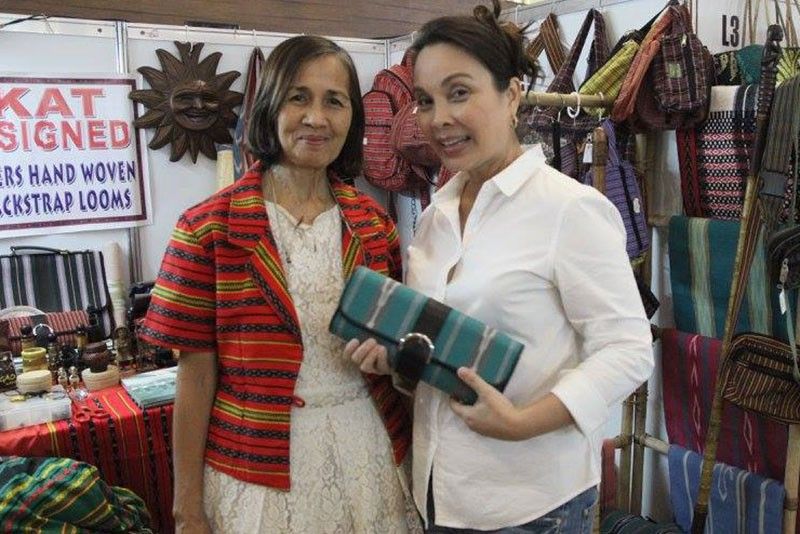When arts and crafts mean business

MANILA, Philippines – Senator Loren Legarda first met Rhoda Pon-an of the Antique Development Foundation (ADF) in 2012 when she started ordering various hand-woven products such as baskets and bags made from abaca, nito and bariw fiber — which is sourced from the bariw tree that is plentiful in Antique — to promote and give away as gifts among her friends.
Legarda invited Pon-An to participate in the Hibla Pavilion of Textiles and Weaves of the Philippines, a Manila FAME Design and Lifestyle Event where Legarda introduced Pon-an to Doña Bea Zobel, who ordered bariw carpets from Pon-an.
Since then, Zobel has been a regular customer of ADF. It is this kind of support that has made it possible for small entrepreneurs like Pon-an to thrive and prosper.
ADF was one of the 120 groups and individuals from different regions of the country who participated in the National Arts and Crafts Fair held recently at the Megatrade Hall of SM Megamall. Spearheaded by the Department of Trade and Industry (DTI) and supported by Senator Legarda, a number of the participants have been receiving assistance from Legarda through the years.
Sammy Buhle of Ifugao Ikat runs a home-based weaving center specializing in ikat weaving. He was featured in the National Museum’s weaving demonstrations — part of the lecture series on Philippine Traditional Textiles and Indigenous Knowledge that Legarda and the National Museum initiated “not only to perpetuate weaving and indigenous knowledge but also to help promote weaving communities and their products,” Legarda noted. Through these forms of support, Buhle and others like him are able to cope with certain challenges that small enterprises face, such as pay off their debt from the Department of Science and Technology (DOST) so that the looms, sewing machines and other equipment issued to them would not be forfeited.
Access to raw materials and equipment is a common difficulty faced by micro-entrepreneurs. Lily Luglug of Lab Tie Dye Weavers Association, which started in 2009, had been participating in trade fairs but usually had minimal stocks due to lack of equipment and raw materials.
“Since we received a loom and other weaving material from the National Commission for Culture and the Arts (NCCA) through the support of Senator Legarda, our productivity has increased significantly,” Luglug shares.
“We have this ‘One Loom, One Family’ project with the NCCA,” Legarda says. “It has become nationwide, so whether you are from Abra or from Iloilo, whoever needs a loom to perpetuate the craft is given one, and possibly even cotton thread, like this family in Abra that was given cotton thread to meet their need.”
Norma Agaid of Penarrubia, Abra, is grateful to the senator for responding to their request for assistance so they could continue with the weaving tradition that has been part of their culture for generations.
Our country has a rich tradition, not only of weaving but also of basketry, embroidery, and beading, as well as wood carving and metalcraft by our naturally skilled local craftsmen and artisans. Today, many of our contemporary designers are applying these traditional methods using indigenous materials, with an eye on the international market.
While Legarda is a staunch advocate for the preservation of our heritage and traditions through the promotion of culture and the arts, she also believes that heritage and development go hand in hand.
“For many, heritage and development are two contrasting concepts because development is usually associated with what is new and that which would make life better and comfortable, while heritage is that which is old, less exciting and usually commemorated only during special occasions,” Legarda remarked. “But today, we are filled with our heritage — traditions, art and culture, indigenous knowledge, skills and practices, local crafts — which have become a source of livelihood and development, of families, communities and our nation as a whole. We see our heritage as a source of income, as a way to create more micro, small and medium enterprises.”
Senator Legarda is the author of RA 9501 or the Magna Carta for Micro, Small and Medium Enterprises (MSMEs). The law provides “more assistance to entrepreneurs by requiring lending institutions to allocate at least eight percent, an increase from the previous six percent, of their total loan portfolio to micro and small businesses. It also provides access to new technologies and regular entrepreneurship training programs for workers, to ensure the viability and growth of MSMEs in the country.”
Legarda also authored RA 9509 or the Barangay Kabuhayan Act, which complements RA 9501, since recipients of the livelihood and skills training programs in the centers established under the Barangay Kabuhayan Act may avail of the funding and technical support that are available under the MSMEs Act.
“MSMEs have a huge potential if given adequate support, and what I want to see is how we can further promote our culture and heritage through MSMEs,” Legarda said.



















